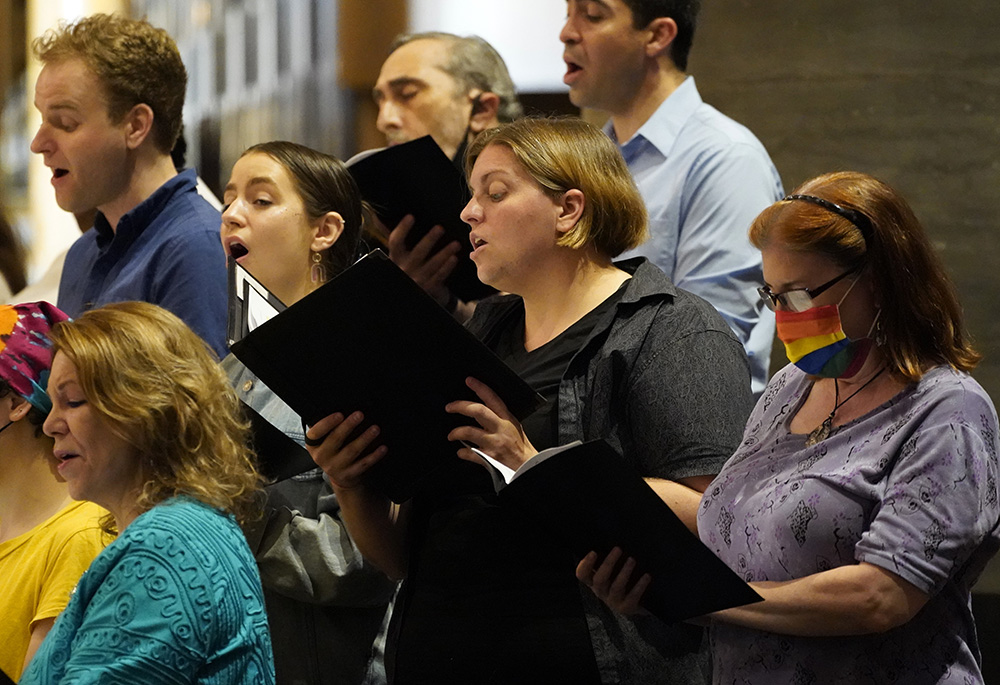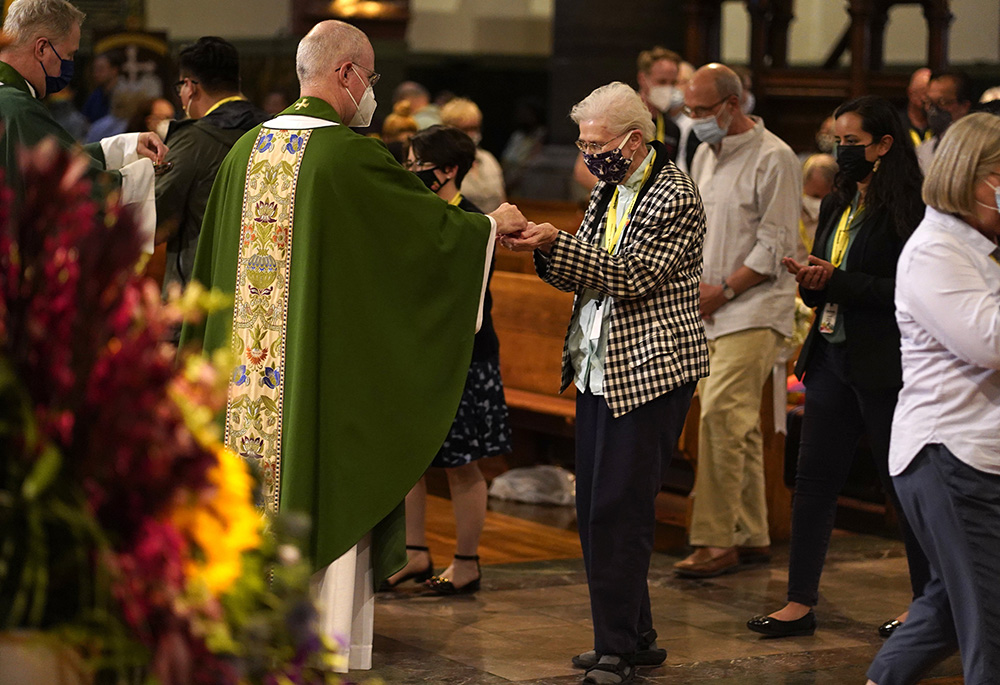
Choir members sing during a Mass at St. Paul the Apostle Church June 25 in New York City for participants of the Outreach LGBTQ Catholic Ministry Conference. The event, held at the church and at the Lincoln Center campus of Fordham University June 24 and 25, drew 250 registrants from across the U.S. and from Colombia, Italy, Spain and Uganda. (CNS/Gregory A. Shemitz)
More than 200 people from across the country gathered at Fordham University from June 24-25 for the first Outreach conference focused on LGBTQ Catholic ministry.
The conference had three keynote speakers: Bishop John Stowe of Lexington, Kentucky, Fr. Bryan Massingale* and Loretto Sr. Jeannine Gramick. Jesuit Fr. James Martin, the editor of the new Outreach online resource, officiated our Mass and led us throughout the conference.
In addition, there were eight panels that covered topics including best practices in parish ministry and in Catholic schools; ministry with families of LGBTQ Catholics; employment in Catholic institutions; ministry with transgender people; LGBTQ issues and mental health; and issues of race, ethnicity and intersectionality.
The entire conference was uplifting and it created a space for LGBTQ Catholics, parents and allies to gather, make community and feel welcome in a safe church space. It was also a safe space to discuss many of the issues those of us in LGBTQ Ministry face daily, and the opposition we sometimes have to deal with in doing our work.
The conference started with Stowe telling us all, "I love you." He reminded us that Jesus knew human love and had special love for friends he was close with, and suffered with. This seems to indicate, he said, that "love is the priority, that love comes first. There is no morality without love of God and love of neighbor."

Loretto Sr. Jeannine Gramick receives Communion from Jesuit Fr. James Martin, author and editor at large of America Media, during a Mass at St. Paul the Apostle Church June 25 in New York City, for participants of the Outreach LGBTQ Catholic Ministry Conference. (CNS/Gregory A. Shemitz)
During Massingale's keynote on June 25 and later during our panel together on race, ethnicity and intersectionality, the priest spoke of the need to be intersectional in our approach to ministry. Quoting Black poet Audre Lorde, he reminded us that LGBTQ persons don't live single-issue lives, that we are not just one aspect of ourselves, and that we must address the entire being.
He reminded the audience that white supremacy is present in society and in the church, and that white supremacy is intersectional — it targets migrants, the Black community, the LGBTQ community, and women alike. If we are to be true to our inclusive, welcoming mission, we must be intersectional as well; something our LGBTQ ministries can certainly improve on.
During our panel session, I reminded the audience that when the Equality Act, which would expand civil rights to include LGBTQ people, was being debated in Congress, the U.S. Conference of Catholic Bishops published an FAQ explaining why they opposed the bill.
In the FAQ, the bishops described the LGBTQ community as a community that is no longer vulnerable or in need of protection, a community that earns "higher incomes than the national average" and who are commonly held in "high regard."
I brought up this description during our panel because it illustrates one of the biggest things getting in the way of our ministry: the idea that while the church stands with the vulnerable and it stands against discrimination, LGBTQ people no longer need protection because we are "no longer vulnerable." This could not be further from the truth.
I shared with the audience my intersectional identities: I am queer, a woman, Latina, and undocumented, and I certainly do not identify with any of those statements. In reading the bishops' official position and opinion of who LGBTQ Catholics are, it is obvious to me that many in the leadership of the church are very far away from the LGBTQ community at large.
Advertisement
The picture they're presenting is … incomplete. This picture is based on the idea that the LGBTQ community is only white, male and privileged; a view perhaps reinforced by the stereotype we most often see in media and in corporate America.
For those close to LGBTQ persons, it is evident that even among this demographic, white and male, there is still vulnerability based on one's orientation or identity. Furthermore, for those of us who are not part of this demographic, discrimination is often compounded by gender, race, religion, class or other factors.
In order for us to do a better job, we must be more inclusive in our own ministries and we must raise the voices of the most vulnerable; it is not about being a voice of the voiceless, it is about "passing the mic" whenever possible.
During her keynote, Gramick, a trailblazer who has been ministering in LGBTQ Ministry for more than 50 years, explained to us the progress that she has seen during her 50-plus years in ministry and gave us a hopeful perspective, with an understanding that while the church moves slowly, the Holy Spirit is still moving. While we may get desperate because Francis is not a reformer who would make changes quickly and on his own, the Holy Spirit moves through the synodal path and nothing can stop her.
During the weekend, we reminded each other that we are all part of the body of Christ, and we all belong. As the famous Catholic hymn says, "All are welcome in this place."
* This article has been edited to remove an incorrect reference to a religious order. Massingale is a priest of the Archdiocese of Milwaukee.








